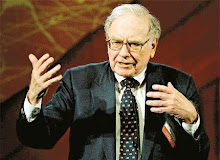
It was worth every dime. Buffett is the most successful investor in history, yet he has reached that pinnacle while also being supremely ethical. As remarkable for his philanthropy as for his stock-picking, he's giving the bulk of his billions to the Bill & Melinda Gates Foundation; likewise, the fee for our lunch would go to the Glide Foundation, which helps the poor and homeless. Lunch with Buffett, we figured, would be a good way to give to charity, but it would also be the ultimate capitalist master class — a chance to see up close what makes the Sage of Omaha tick and to learn from his wisdom.
And so it was that my wife and I sat down for lunch with Buffett in a cozy, wood-paneled alcove of the Manhattan steakhouse Smith & Wollensky. Mohnish brought along his wife and two daughters, who sat on either side of Buffett. When the menus arrived, Buffett, now 77 years old, joked with the girls that he doesn't eat anything he wouldn't touch when he was less than 5. His order: a medium-rare steak with hash browns and a cherry coke — a fitting choice, given that his company, Berkshire Hathaway, is Coca-Cola's largest shareholder.
Characteristically, Buffett had done his homework: he'd found out in advance, for example, that my wife was born in Salisbury, North Carolina. But after a minimum of small talk to put us at ease, it was down to more serious matters. When I mentioned how difficult I'd recently found it to do the right thing by lowering the fees I charged my fund's shareholders, Buffett nodded sympathetically and observed, "People will always try to stop you doing the right thing if it is unconventional." When I asked if it would get any easier, he replied with a wry smile: "Just a little."
Buffett has made a point of doing business with integrity — and of working only with people who share his values. As we learned, he credits his father with teaching him early on to rely on his own sense of what's right, rather than looking for affirmation from others. "It's very important to live your life by an internal yardstick," he told us, noting that one way to gauge whether or not you do so is to ask the following question: "Would you rather be considered the best lover in the world and know privately that you're the worst — or would you prefer to know privately that you're the best lover in the world, but be considered the worst?"
When it comes to investing, nothing is more important than the ability to think rationally for oneself — and Buffett is unsurpassed on this front. In the late '90s, he was criticized for his refusal to invest in booming tech and Internet stocks — a decision that was vindicated when the bubble burst. Buffett has made a fine art of keeping this kind of distracting noise at bay: he said he even limits his contact with managers of businesses in which he invests, preferring to assess their companies' financial records — a more neutral source of information. Equally vital to his success, Buffett said he focuses only on investments that lie well within his "circle of competence." As a result, he confided, whenever he makes an investment, he has no doubt at all that he's right.
For most people, attaining the intellectual clarity and emotional detachment that investing requires is tough. But Buffett, for all his affability, is shrewd about disengaging himself to avoid any unnecessary distractions that might impair his judgment. People often try to convince him to meet with them so they can pitch investments to him, he said, but he sees through their many ruses — not least their flattery — and is comfortable saying no far more often than he says yes.
One thing Buffett wasn't about to say no to was dessert. He delighted in sampling an array of them, telling the waiter: "Just bring a couple of spoons, and I'll have a little of everyone's." His zest for life is clearly undiminished — indeed, in Berkshire's latest annual report, he wrote that he and his octogenarian partner Charlie Munger "tap-dance to work."
What better role model could you ask for than this? And how do you put a price on the opportunity to spend nearly three hours in his company? Well, two days after our meal, the auction closed on eBay for next year's lunch with Buffett. The winner, a Chinese money manager named Zhao Danyang, bid $2.1 million. So, that proves it: our $650,100 lunch was a total bargain.
Guy Spier is CEO of Aquamarine Capital Management
